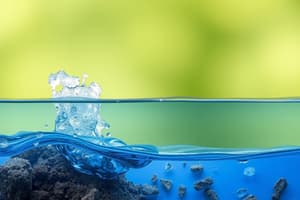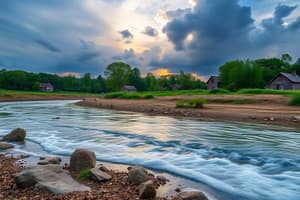Podcast
Questions and Answers
What is the main difference between weather and climate?
What is the main difference between weather and climate?
- Weather refers to average conditions over 30 years, while climate is daily environmental changes.
- Weather corresponds to daily atmospheric conditions, while climate refers to long-term averages. (correct)
- Weather measures humidity only, while climate encompasses all types of weather events.
- Weather is only about temperature, whereas climate includes temperature and precipitation.
Which of the following describes a glacier?
Which of the following describes a glacier?
- An area of land where all the water evaporates.
- A fast-moving river of ice.
- A large covering of ice formed instantly.
- A slowly moving mass of ice formed from accumulated snow over hundreds of years. (correct)
How does a closed watershed differ from an open watershed?
How does a closed watershed differ from an open watershed?
- An open watershed is formed by glaciers.
- A closed watershed drains directly into the ocean.
- A closed watershed can only release water through evaporation or groundwater. (correct)
- An open watershed allows for no evaporation.
What is a primary purpose of water desalination?
What is a primary purpose of water desalination?
Which process uses a semi-permeable membrane to filter water?
Which process uses a semi-permeable membrane to filter water?
What impact does overuse of water resources have?
What impact does overuse of water resources have?
What type of sea ice do polar bears prefer for hunting?
What type of sea ice do polar bears prefer for hunting?
Which of the following human actions contributes to global warming?
Which of the following human actions contributes to global warming?
Flashcards
Climate
Climate
Average weather conditions over at least 30 years.
Heat sink
Heat sink
Something that absorbs thermal energy without heating up much.
Glacier
Glacier
A slowly moving mass of ice, formed over many years by accumulated snow.
Water desalination
Water desalination
Signup and view all the flashcards
Open watershed
Open watershed
Signup and view all the flashcards
Closed watershed
Closed watershed
Signup and view all the flashcards
Multiyear ice
Multiyear ice
Signup and view all the flashcards
Global warming contributors
Global warming contributors
Signup and view all the flashcards
Study Notes
Weather vs. Climate
- Weather describes short-term changes (e.g., temperature, precipitation, sunshine).
- Climate describes long-term average weather patterns (at least 30 years).
Heat Sinks
- Heat sinks absorb thermal energy without significant temperature increase.
- Water is an example.
Glaciers and Ice Caps
- Glaciers are slowly moving masses of ice formed by accumulated snow.
- Ice caps are large ice coverings on land.
Watersheds
- Watersheds are land areas where water collects and drains.
- Open watersheds drain into oceans.
- Closed watersheds only drain through evaporation or groundwater.
Water Desalination
- Water desalination removes salt from water to make it drinkable.
- Desalination plants are large and necessary due to water scarcity in many regions.
- Methods include the thermal process (evaporation and condensation) and reverse osmosis (high-pressure filtration).
Water Conservation
- Conserving water is crucial for addressing scarcity issues, environmental protection, and creating a sustainably future.
- Overuse depletes freshwater resources, harming the environment.
- Reduces costs, protects water quality, and ensures equitable access.
Polar Bears
- Polar bears rely on multi-year ice for hunting (ringed and bearded seals).
- They have a reduced feeding period during summer, waiting for the ice to return.
Global Warming Factors
- Human activities contribute to global warming.
- Burning fossil fuels, deforestation, and livestock farming increase greenhouse gases.
- These gases enhance the greenhouse effect, leading to higher temperatures.
Melting Polar Ice Effects
- Melting glaciers and ice caps have significant uncertainty, but if entirely melted, global sea levels would rise 230 ft, flooding coastal areas.
Studying That Suits You
Use AI to generate personalized quizzes and flashcards to suit your learning preferences.
Description
Explore the fundamental concepts of weather, climate, and water resources in this quiz. Learn about heat sinks, glaciers, watersheds, desalination methods, and the importance of water conservation. This comprehensive overview is essential for understanding our environmental challenges.




